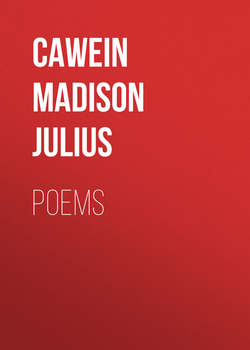Читать книгу Poems - Cawein Madison Julius - Страница 19
POEMS
DEEP IN THE FOREST
ОглавлениеI. SPRING ON THE HILLS
Ah, shall I follow, on the hills,
The Spring, as wild wings follow?
Where wild-plum trees make wan the hills,
Crabapple trees the hollow,
Haunts of the bee and swallow?
In redbud brakes and flowery
Acclivities of berry;
In dogwood dingles, showery
With white, where wrens make merry?
Or drifts of swarming cherry?
In valleys of wild strawberries,
And of the clumped May-apple;
Or cloudlike trees of haw-berries,
With which the south winds grapple,
That brook and byway dapple?
With eyes of far forgetfulness,—
Like some wild wood-thing's daughter,
Whose feet are beelike fretfulness,—
To see her run like water
Through boughs that slipped or caught her.
O Spring, to seek, yet find you not!
To search, yet never win you!
To glimpse, to touch, but bind you not!
To lose, and still continue,
All sweet evasion in you!
In pearly, peach-blush distances
You gleam; the woods are braided
Of myths; of dream-existences….
There, where the brook is shaded,
A sudden splendor faded.
O presence, like the primrose's,
Again I feel your power!
With rainy scents of dim roses,
Like some elusive flower,
Who led me for an hour!
II. MOSS AND FERN
Where rise the brakes of bramble there,
Wrapped with the trailing rose;
Through cane where waters ramble, there
Where deep the sword-grass grows,
Who knows?
Perhaps, unseen of eyes of man,
Hides Pan.
Perhaps the creek, whose pebbles make
A foothold for the mint,
May bear,—where soft its trebles make
Confession,—some vague hint,
(The print,
Goat-hoofed, of one who lightly ran,)
Of Pan.
Where, in the hollow of the hills
Ferns deepen to the knees,
What sounds are those above the hills,
And now among the trees?—
No breeze!—
The syrinx, haply, none may scan,
Of Pan.
In woods where waters break upon
The hush like some soft word;
Where sun-shot shadows shake upon
The moss, who has not heard—
No bird!—
The flute, as breezy as a fan,
Of Pan?
Far in, where mosses lay for us
Still carpets, cool and plush;
Where bloom and branch and ray for us
Sleep, waking with a rush—
The hush
But sounds the satyr hoof a span
Of Pan.
O woods,—whose thrushes sing to us,
Whose brooks dance sparkling heels;
Whose wild aromas cling to us,—
While here our wonder kneels,
Who steals
Upon us, brown as bark with tan,
But Pan?
III. THE THORN TREE
The night is sad with silver and the day is glad with gold,
And the woodland silence listens to a legend never old,
Of the Lady of the Fountain, whom the faery people know,
With her limbs of samite whiteness and her hair of golden glow,
Whom the boyish South Wind seeks for and the girlish-stepping Rain;
Whom the sleepy leaves still whisper men shall never see again:
She whose Vivien charms were mistress of the magic Merlin knew,
That could change the dew to glowworms and the glowworms into dew.
There's a thorn tree in the forest, and the faeries know the tree,
With its branches gnarled and wrinkled as a face with sorcery;
But the Maytime brings it clusters of a rainy fragrant white,
Like the bloom-bright brows of beauty or a hand of lifted light.
And all day the silence whispers to the sun-ray of the morn
How the bloom is lovely Vivien and how Merlin is the thorn:
How she won the doting wizard with her naked loveliness
Till he told her dæmon secrets that must make his magic less.
How she charmed him and enchanted in the thorn-tree's thorns to lie
Forever with his passion that should never dim or die:
And with wicked laughter looking on this thing which she had done,
Like a visible aroma lingered sparkling in the sun:
How she stooped to kiss the pathos of an elf-lock of his beard,
In a mockery of parting and mock pity of his weird:
But her magic had forgotten that "who bends to give a kiss
Will but bring the curse upon them of the person whose it is":
So the silence tells the secret.—And at night the faeries see
How the tossing bloom is Vivien, who is struggling to be free,
In the thorny arms of Merlin, who forever is the tree.
IV. THE HAMADRYAD
She stood among the longest ferns
The valley held; and in her hand
One blossom, like the light that burns
Vermilion o'er a sunset land;
And round her hair a twisted band
Of pink-pierced mountain-laurel blooms:
And darker than dark pools, that stand
Below the star-communing glooms,
Her eyes beneath her hair's perfumes.
I saw the moonbeam sandals on
Her flowerlike feet, that seemed too chaste
To tread true gold: and, like the dawn
On splendid peaks that lord a waste
Of solitude lost gods have graced,
Her face: she stood there, faultless-hipped,
Bound as with cestused silver,—chased
With acorn-cup and crown, and tipped
With oak leaves,—whence her chiton slipped.
Limbs that the gods call loveliness!—
The grace and glory of all Greece
Wrought in one marble shape were less
Than her perfection!—'Mid the trees
I saw her—and time seemed to cease
For me.—And, lo! I lived my old
Greek life again of classic ease,
Barbarian as the myths that rolled
Me back into the Age of Gold.
